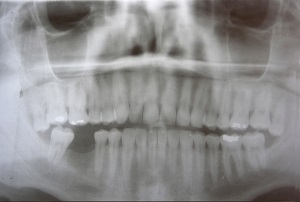
by Dr. Jacqueline S. Allen | Feb 2, 2016 | Blog, Endodontist, Phoenix Endodontic Group
 Endodontics is one of nine specialties recognized by the American Dental Association, so it’s not surprising that Phoenix endodontists get many of their patients from referrals from general dentists. According to the American Association of Endodontists, 97 percent of general dentists referred a patient to an endodontist last year.
Endodontics is one of nine specialties recognized by the American Dental Association, so it’s not surprising that Phoenix endodontists get many of their patients from referrals from general dentists. According to the American Association of Endodontists, 97 percent of general dentists referred a patient to an endodontist last year.
There are several reasons endodontic referrals are made, all of which result in a better outcome for you and your teeth.
Why Phoenix endodontists receive referrals
- Experience and training – Endodontists receive two to three years of postgraduate training in this special practice area, which relates to treating the diseases of the inner dental pulp and nerves. They also typically do many more root canals than general dentists do – as many as 25 per week, versus a general dentist, who may average two root canals a week.
- Equipment – Root canals are performed with specialized equipment that includes microscopes with which to view the surgery area and files to clean out the infected canals.
- Ability to treat complex or unusual cases – Many patients who are referred to an endodontist have tooth roots that may be curved, have multiple roots for one tooth, or have other anomalies. Endodontists rely on their additional training and expertise to guide them through successful treatment of these unique cases.
- Ability to make the treatment comfortable – Endodontists can often perform root canals and other related procedures more quickly than general practitioners, which can result in greater comfort and reduced anxiety for a patient.
“Your Phoenix endodontist has close professional relationships with many general dentists in the Valley,” says Dr. Allen, who practices with the Phoenix Endodontic Group. “We are able to provide fast, efficient, successful treatments within our area of practice, so general practitioners may focus on providing other services.”

by Dr. Jacqueline S. Allen | Jan 27, 2016 | Blog, Endodontist, Phoenix Endodontic Group
 One of the most traumatic dental injuries a person can experience is having a permanent (“adult”) tooth knocked out. Many knocked-out teeth happen as a result of sports injuries or other accidental blows to the face. The good news is that if proper steps are followed immediately after the tooth is dislodged, it is possible for your Phoenix endodontist to help you save the tooth.
One of the most traumatic dental injuries a person can experience is having a permanent (“adult”) tooth knocked out. Many knocked-out teeth happen as a result of sports injuries or other accidental blows to the face. The good news is that if proper steps are followed immediately after the tooth is dislodged, it is possible for your Phoenix endodontist to help you save the tooth.
Saving Your Knocked-Out Tooth
- Pick up the tooth by the crown, not the root. It’s essential for the tooth’s survival that you pick up the tooth by the biting surface, not the root.
- Gently clean the tooth if it is dirty … but be careful how you do it. Gently clean the tooth with water. It’s important not to clean the tooth with soap or chemicals, to scrub the knocked-out tooth, or to wipe it with or wrap it in a cloth.
- Keep the tooth moist at all times. The best ways to keep the tooth moist after cleaning it are to keep it in milk, in the contents of an emergency tooth preservation kit such as Save-A-Tooth, or to place it back inside of your mouth.
- Reposition the tooth in its socket if that is possible. The sooner the tooth is replaced, the greater the likelihood it will survive. If you can get the tooth to sit in its socket, hold the tooth in place with fingers or by gently biting down on it.
- See your Phoenix endodontist immediately. Time is of the essence with a knocked-out tooth. The first hour is crucial. If you can get to a Phoenix endodontist within the first 20 minutes for emergency treatment, that’s even better.
Once you arrive at your Phoenix endodontist, he or she will splint the tooth in place and evaluate its condition. The splint may stay in place for up to several weeks. Because the tooth has been knocked out by its roots, he or she may recommend root canal treatment to avoid infection and provide long-term stability for the tooth.
“Don’t assume that if your tooth has been knocked out, it can’t be saved,” says Dr. Allen, who practices with the Phoenix Endodontic Group. “Your Phoenix endodontist can often save your tooth, and it can remain in your mouth for a lifetime.”

by Dr. Jacqueline S. Allen | Dec 2, 2015 | Blog, Dentistry, Endodontist, Patients
 It can take self-discipline to make appointments for regular dental care, but here’s a reason to be thankful you are able to make and pay for those checkups: surveys have indicated that 21 percent of Arizona adults and 31 percent of all Arizona children have never had a dental check-up. Even more concerning, more than 44 percent of Arizonans lack dental insurance, making care of critical dental needs financially challenging.
It can take self-discipline to make appointments for regular dental care, but here’s a reason to be thankful you are able to make and pay for those checkups: surveys have indicated that 21 percent of Arizona adults and 31 percent of all Arizona children have never had a dental check-up. Even more concerning, more than 44 percent of Arizonans lack dental insurance, making care of critical dental needs financially challenging.
To rectify this situation, the Central Arizona Dental Society Foundation is hosting its annual Arizona Dental Mission of Mercy (AZMOM) event on Dec. 11 and 12 at the Arizona State Fairgrounds, 1826 W. McDowell Road, Phoenix. AZMOM is a dental clinic that offers basic dental care at no cost to the individuals being treated.
More than 2,000 patients are seen each year at the AZMOM event, and care is provided at the dental clinic by nearly 1,500 volunteers, including clinicians such as dentists, dental hygienists and dental assistants, as well as hundreds of non-clinical volunteers who help make the event run smoothly. In 2014, $1.8 million in free dental care was provided.
Because it is a dental clinic in a temporary location set up for a short duration, AZMOM focuses on providing basic care and relieving pain and infection. Patients are seen on a first-come, first-served basis. Providers treat patients by performing extractions, filling cavities and performing prophylactic dental cleanings.
Those wanting to participate in the AZMOM event will want to arrive well before the clinic doors open at 6 a.m. each day. Once the total numbers of patients that can seen each day have been registered, no additional patients can be accommodated. Patients seeking treatment at the dental clinic should be prepared to spend the entire day at the event.
Dr. Jacqueline S. Allen, who practices with the Phoenix Endodontics Group, said the AZMOM event was a way for dental professionals in Arizona to give back to the community and improve the state’s overall oral health situation. “The free AZMOM dental clinic allows dentists to provide critical care to those who need it the most, and can afford it the least,” she said. “Please spread the word to anyone who could benefit from this event.”
More information on the AZMOM event is available online at the AZMOM website.
by Dr. Jacqueline S. Allen | Nov 9, 2015 | Blog, Endodontist
Our teeth are sturdy and resilient enough to last a lifetime. However, sometimes we can experience a dental condition that will put the health of a natural tooth at risk. It can be tricky to know exactly when to see a Phoenix endodontist, when to see your general dentist, and when to take a “wait and see” approach to a tooth challenge. Here are several situations in which you should definitely consider making an appointment to see your Phoenix endodontist to make sure your natural tooth will survive and thrive.
It may be time to see a Phoenix endodontist when …
- You have serious tooth decay that’s led to a bacterial infection. Bacterial plaque forms on our teeth almost immediately after we eat. It can wear down the tooth’s enamel, and eventually tooth decay can erode much of the tooth’s structure. Oral bacteria are the most common cause of endodontic problems, and infection in your natural teeth can lead to an abcess if not properly cared for.
- You have a chip or crack in your natural tooth. Tooth decay can gradually wear down your tooth’s structure; damage from a chip or crack can create that structural damage in an instant. These sorts of dental injuries can expose the vulnerable tooth pulp to infection, leading to the need for a root canal treatment.
- You’ve experienced a dental injury. If you experienced a blow to your mouth or face, you may need to be seen by a Phoenix endodontist to evaluate a chipped or cracked tooth, or even a tooth that has partially or completely dislodged itself from your jaw. Even if the tooth or teeth that absorbed most of the impact seems fine, it’s a good idea to make an appointment with your endodontist; sometimes teeth adjacent to the injury site can be affected, as well.
It’s important to note that an adult natural tooth can survive with out its inner pulp (which is why root canal treatments are often so successful), but it is not always able to remain in one’s jaw if the structural damage caused by an infection or injury is too great. “Your Phoenix endodontist will evaluate your tooth carefully when you’re experiencing discomfort or concern, and provide specialized treatments, if needed, to conserve your natural tooth,” says Dr. Allen, who practices with the Phoenix Endodontic Group.

by Dr. Jacqueline S. Allen | Aug 31, 2015 | Blog, Endodontics, Endodontist, Phoenix Endodontic Group, Root Canal
 If you are making an appointment to visit our office, chances are your dentist suspects you may need a root canal. The reasons for needing a root canal vary – perhaps you may be experiencing pain, swelling and sensitivity to heat or cold. You may not have symptoms at all, but your dentist may see something on the x-ray that makes a tooth look “suspicious.” Whatever it is that brings you to a Phoenix endodontist, if you know what to expect at your first visit you can help to manage your expectations accordingly.
If you are making an appointment to visit our office, chances are your dentist suspects you may need a root canal. The reasons for needing a root canal vary – perhaps you may be experiencing pain, swelling and sensitivity to heat or cold. You may not have symptoms at all, but your dentist may see something on the x-ray that makes a tooth look “suspicious.” Whatever it is that brings you to a Phoenix endodontist, if you know what to expect at your first visit you can help to manage your expectations accordingly.
It has been said that there are three fears when visiting a dentist: time, money, and pain. Let’s examine those three fears:
Time: A visit to the Phoenix Endodontic Group is not much different than a visit to your dentist. If you are being seen on an emergency basis, staff will be working you in between scheduled patients and will do their best to see that you are comfortable and as pain free as possible as you wait to see the endodontist. Be aware that cases seen by Phoenix endodontists can be more difficult and complex than routine dental visits. This means that the endodontist may have to spend a little more time with the patient before you to take care of their needs. Be assured that both Dr. Jacqueline S. Allen, and Dr. Allen will spend whatever time is necessary with you – to alleviate your pain and discomfort.
Money: Receiving quality dental care does indeed cost money and having a root canal is no exception. As you would do before going to make any purchase, be prepared for the financial discussion at the endodontic office. If you have dental insurance it is a good idea to present your insurance card or at least have basic information regarding your dental plan before you go for your appointment. The treatment coordinator will assist with obtaining information from the insurance company, filing the claim, etc. Bear in mind that your benefits represent an agreement between you and your dental insurance company – the endodontic office tries to help facilitate the process, however at times it may be necessary for you to communicate directly with the insurance company for detailed information and questions. The dental insurance company is prohibited by law from discussing certain aspects of coverage with anyone other than you.
Pain: No one likes to hurt – no one likes tooth pain. The endodontists at Phoenix Endodontic Group specialize in alleviating tooth pain and discomfort and get you back to feeling normal as quickly as possible. Over the counter pain medication such as Tylenol, Advil and Alleve are all very effective in fighting pain, swelling and discomfort associated with tooth pain. Additionally, antibiotics such as Amoxicillin will be prescribed to combat infections and a small percentage of patients may require stronger, prescription pain relievers.
The endodontist’s office is usually not first on anyone’s list as a place to hang out. If you ever have to visit one of our Phoenix endodontists, rest assured that we have the experience to treat you with competence and compassion. We will help you to get through the issue that brought you to our office in the first place – and help to manage those three fears: time, money and pain.

by Dr. Jacqueline S. Allen | Feb 16, 2015 | Blog, Endodontics, Endodontist, General Information
 A day in the life of your Phoenix Endodontic Group brings many different types of cases into the office. One common visitor who comes in for Dr. Allen’s expertise is the candy connoisseur. You may know what too many sweets can do to your waistline, but do you know what effect it may have on your teeth?
A day in the life of your Phoenix Endodontic Group brings many different types of cases into the office. One common visitor who comes in for Dr. Allen’s expertise is the candy connoisseur. You may know what too many sweets can do to your waistline, but do you know what effect it may have on your teeth?
Sugar is a highly toxic substance to your tooth enamel and is present in many types of food and drinks. Soda, fruit juices, cookies and candy are all prime culprits that cause tooth decay, especially if allowed to linger in your mouth. Ingestion of sugar promotes the plaque that eats away at your teeth. A particularly bad type of sweet is sticky candy. Soft sticky candies often get caught between the teeth and if you aren’t a good flosser, can cause cavities in that area, says Dr. Allen.
Another dental problem could be caused by eating hard candy. Extremely hard candies that are “chewed” can also cause damage (cracks) to the tooth, explains Dr. Allen. This type of damage allows bacteria to invade the tooth and infect the inner pulp and root system. Eventually a problem of this nature may require your endodontist to perform a root canal. If you are going to consume hard candies, avoid biting or chewing them, especially with your more vulnerable front teeth.
As well-intentioned as patients are in their desires to follow a healthy diet and practice good dental habits, no one is perfect in either arena. If you are going to enjoy a sugary snack, then always attempt to brush afterward. If that is not possible, then rinsing your mouth out with water can help, but minimally, states Dr. Allen. Be as diligent as possible in flossing after sticky treats.
Sugar is acceptable in moderation, especially if you practice good dental habits when you eat sweets. However, it is far more common that it will cause problems with your teeth. If you are a lover of these kinds of treats, talk to Dr. Allen, your Phoenix endodontist, for advice on how to prevent dental damage.

 Endodontics is one of nine specialties recognized by the American Dental Association, so it’s not surprising that Phoenix endodontists get many of their patients from referrals from general dentists. According to the American Association of Endodontists, 97 percent of general dentists referred a patient to an endodontist last year.
Endodontics is one of nine specialties recognized by the American Dental Association, so it’s not surprising that Phoenix endodontists get many of their patients from referrals from general dentists. According to the American Association of Endodontists, 97 percent of general dentists referred a patient to an endodontist last year.

 One of the most traumatic dental injuries a person can experience is having a permanent (“adult”) tooth knocked out. Many knocked-out teeth happen as a result of sports injuries or other accidental blows to the face. The good news is that if proper steps are followed immediately after the tooth is dislodged, it is possible for your Phoenix endodontist to help you save the tooth.
One of the most traumatic dental injuries a person can experience is having a permanent (“adult”) tooth knocked out. Many knocked-out teeth happen as a result of sports injuries or other accidental blows to the face. The good news is that if proper steps are followed immediately after the tooth is dislodged, it is possible for your Phoenix endodontist to help you save the tooth.




